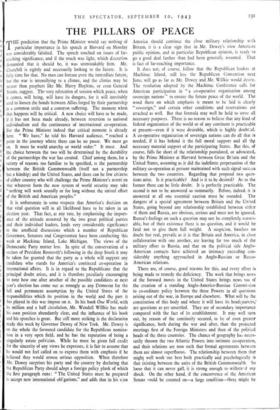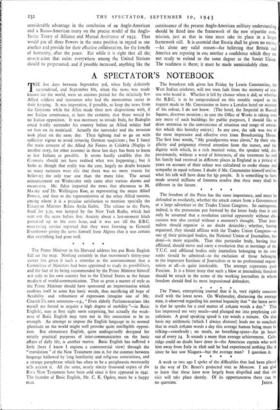THE PILLARS OF PEACE
THE prediction that the Prime Minister would say nothing of particular importance in his speech at Harvard on Monday was considerably falsified. The speech touched on issues of far- reaching significance, and if the touch was light, which discretion demanded that it should be, it was unmistakably firm. Mr. Churchill is rightly and necessarily looking to the future. It is fully time for that. No man can foresee even the immediate future, but the war is intensifying to a climax, and the cliniax may be nearer than prophets like Mr. Harry Hopkins, or even General Smuts, suggest. The very relaxation of tension which peace, when it comes, will bring, will have its dangers, for it will inevitably tend to loosen the bonds between Allies forged by their partnership in a common strife and a common suffering. The moment when that happens will be critical. A new choice will have to be made, if it has not been made already, between reversion to national individualism and the continuance of international co-operation. For the Prime Minister indeed that critical moment is already here. " We have," he told his Harvard audience, " reached a point in the journey where there can be no pause. We must go on. It must be world anarchy or world order." It must. And the choice between the two will be determined by the durability of the partnerships the war has created. Chief among them, for a variety of reasons too familiar to be specified, is the partnership between the British Commonwealth (itself not a partnership but a kinship) and the United States, and there can be few citizens of either country who will challenge the Prime Minister's assert: on that whatever form the new system of world security may take "nothing will work soundly or for long without the united effort of the British and American peoples."
It is unfortunate in some respects that America's decision on that vital question will in all likelihood have to be taken in an election year. That fact, at any rate, by emphasising the import- ance of the attitude assumed by the two great political parties and their individual leaders, lends very considerable significance to the unofficial discussions which a number of Republican Governors, Senators and Congressmen have been conducting this week at Mackinac Island, Lake Michigan. The views of the Democratic Party matter less. In spite of the conservatism of a section of President Roosevelt's following in the deep South it may be taken for granted that the party as a whole will support any candidate who stands for America's continued co-operation in international affairs. It is in regard to the Republicans that the principal doubt arises, and it is therefore peculiarly encouraging to note how one after another of the possible candidates at next year's election has come out as strongly as any Democrat for the full and permanent assumption by the United • States of the responsibilities which its position in the world and the part it has played in this war impose on it. In his book One World, with its million and a half circulation, Mr. Wendell Willkie has made his own position abundantly clear, and the influence of his book and his speeches is great. But still more striking is the declaration made this week by Governor Dewey of New York. Mr. Dewey is on the whole the favoured candidate for the Republican nomina- tion in a very open field, and he has the reputation of being a singularly astute politician. While he must be given full credit for the sincerity of any views he expresses, it is fair to assume that he would not feel called on to express them with emphasis if he believed they would arouse serious opposition. When therefore Mr. Dewey surprises his party and the country by declaring that the Republican Party should adopt a foreign policy plank of which the first paragraph runs: "The United States must be prepared to accept new international obligations," and adds that in his view America should continue the close military relationship with Britain, it is a clear sign that in Mr. Dewey's view American public opinion, and in particular Republican opinion, is ready to go a good deal farther than had been generally assumed. That is fact of far-reaching importance.
It does not, of course, follow that the Republican leaders at Mackinac Island, still less the Republican Convention next June, will go as far as Mr. Dewey and Mr. Willkie would desire. The resolution adopted by the Mackinac Conference calls for American participation in " a co-operative organisation among sovereign nations " to ensure the future peace of the world. The word there on which emphasis is meant to be laid is clearly " sovereign," and certain other conditions and reservations are attached as well. But that formula may well be held to serve all necessary purposes. There is no reason to believe that any kind of federal organisation of the world or of any continent is practicable at present—even if it were desirable, which is highly doubt:uL A co-operative organisation of sovereign nations can do all that is needed, if it has behind it the full moral support and all the necessary material support of the participating States. But this, of course, falls far short of the relationship postulated, or advocated, by the Prime Minister at Harvard between Great Britain and the United States, assuming as it did the indefinite perpetuation of the military co-operation at present maintained with such signal success between the two countries. Regarding that proposal two ques- tions arise. Is it practicable? And is it to be desired? As to the former there can be little doubt. It is perfectly practicable. The second is not to be answered so summarily. Before, indeed, it is answered at all one essential caution must be sounded. The dangers of a special agreement between Britain and the United States, going beyond any relationship established between either of them and Russia, are obvious, serious and must not be ignored. Russia's feelings on such a question may not be completely reason- able, but of their existence there is no question, and it would be fatal not to give them full weight. A suspicion, baseless no doubt but real, prevails as it is that Britain and America, in close collaboration with one another, are leaving far too much of the military effort to Russia, and that on the political side Anglo- American contacts have achieved an intimacy exceeding con- siderably anything approached in Anglo-Russian or Russo- American relations.
There are, of course, good reasons for this, and every effort is being made to remedy the deficiency. The week that brings news of the forward moves in the United States brings news too of the creation of a standing Anglo-Americo-Russian Commission to co-ordinate policy between the three Powers in all questions arising out of the war, in Europe and elsewhere. What will be the constitution of this body and where it will have its headcuarters,` are questions as yet unsettled. They are of secondary importance compared with the fact of its establishment. It may well turn out, by reason of the continuity secured, to be of even greater significance, both during the war and after, than the projected meetings first of the Foreign Ministers and therr of the political heads of the three countries. The chance of geography has neces- sarily thrown the two Atlantic Powers into intimate co-operation, and their relations are now such that formal agreements between them are almost superfluous. The relationship between them that might well workout best both practically and psychologically is that existing between the units of the British Commonwealth. So loose that it can never gall, it is strong enough to withsta-d any shock. On the other hand, if the concurrence of the American Senate could be counted on—a large condition—there might be considerable advantage in the conclusion of an Anglo-American and a Russo-American treaty on the precise model of the Anglo- Soviet Treaty of Alliance and Mutual Assistance of 1942. That would put all three Powers in the same position in regard to one another and provide for their effective collaboration, for the benefit of humanity, after the peace. But while it is right that all the co-o:-..e-ation that exists everywhere among the United Nations should be perpetuated, and if possible increased, anything like the continuance of the present Anglo-American military understanding should be fitted into the framework of the new tripartite com- mission, just as that in time must take its place in a larger framework still. It is essential that Russia shall be given no excuse —let alone any valid reason—for believing that Britain and America are reposing in one another a confidence which they are not ready to extend to the same degree to the Soviet Union. The readiness is there; it must be made unmistakably clear.



























 Previous page
Previous page